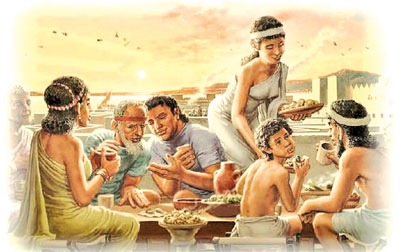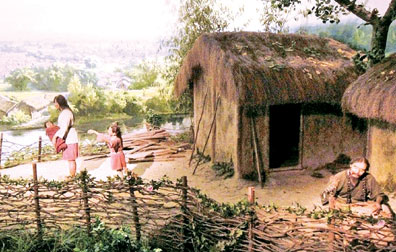Nature domesticated humans
by Daya Dissanayake
It is possible that nature domesticated the human race, by inducing
them to live close to their sources of food. Man in his arrogance even
believes that he created God, and that he is supreme, because he is the
most intelligent, most knowledgable and capable creature on earth.
Yet man is only just another tiny parasite living on Mother earth, a
much tinier entity in the universe, and still tinier in the multiverse.
 Man continues to believe that he can control, defy and destroy
nature. That is probably the reason why he wants to believe that he
domesticated plants and animals. Man continues to believe that he can control, defy and destroy
nature. That is probably the reason why he wants to believe that he
domesticated plants and animals.
'Domestic' has been defined as 'living near or about human
habitations'. But a better term for what happened in deep history would
be 'Naturalisation', instead of 'Domestication'. When we take the
'Domus' out of our mind, we can see the process much more clearly, how
man was naturalised.
Water
It would have been the women who decided where they should settle
down, selecting a space that was close to a source of water and food.
She would have been going out in the morning to gather the food for
herself and her children, and for the man if he was hanging around. She
would not have wanted to move too far away from her children, or to drag
them around with her. Where the food supply lasted longer, she would
have stayed longer.
A longer stay in one location would result in erecting a more
permanent shelter or finding a cave suitable for such a stay. She did
not domesticate the plants around her, but nature, using the plants as
the incentive, domesticated the woman. A man would have been useful to
the woman and her children, to provide some protection from predators,
and in erecting and maintaing their shelter. In return the woman would
have fed him and been his companion.
Thus it was that women domesticated men.
During such a long stay in one place, she would have noticed a new
plant growing from a seed or a root she had thrown away. She would have
been intelligent enough to realise the importance of her discovery.
Harvest
The woman would have nurtured the new plant, and perhaps settled down
for a longer period around the place to reap the harvest. The next
realisation would have been that she need not roam around from one area
to another when the food sources depleted, if she could grow her own
food. The worst mistake she had probably made in the long history of
human evolution was turning into agriculture.
This woman became the first creature to interfere with nature, and
she is still paying for it. Her next mistake was getting her man to help
her in planting her crops. He would have slowly taken over the
agriculture, which made him the owner and provider of the food for the
family. The woman would have let him take over. The dominance of man
over woman would have begun in this manner.
 Once the man took over, he would have tried to domesticate plants and
animals and to dominate nature. Yet even with all his intelligence,
experience and modern technology, he has failed to domesticate his
surroundings. Man is still at the mercy of nature and natural forces,
which are able to destroy in a few moments, crops man had toiled to
plant, and buildings he had taken months and years to erect. Once the man took over, he would have tried to domesticate plants and
animals and to dominate nature. Yet even with all his intelligence,
experience and modern technology, he has failed to domesticate his
surroundings. Man is still at the mercy of nature and natural forces,
which are able to destroy in a few moments, crops man had toiled to
plant, and buildings he had taken months and years to erect.
Control
If man had really domesticated his plants, he would have had them
under his total control. He would not have to carry on research to
develop new varieties and species. Though he claims to have domesticated
animals, the only animals he had been able to bring into his home are
his household pets, the cat and the dog. All other animals are kept by
him as his prisoners, in chains, in cages, or in restricted spaces. He
has to clip the wings of the birds he tries to keep at home or in animal
prisons called zoological gardens.
Man in our part of the world, believes he has domesticated the
elephant. He had tried for several thousand years to do that. He has
been using the elephant as a slave to labour for him, and as a prestige
symbol. He has been able to breed a few elephants in captivity. But he
is still unable to leave his 'domestic' elephant free of its chains, or
without a jail guard with a sharp iron hook.
In his mistaken attempt at domestication, man destroys his
environment, cuts down all the trees, diverts water flows, digs up the
earth for mineral resources, and then builds immense concrete and
asphalt jungles, polluting the entire earth, and now even outer space.
He believes he has conquered nature. But if he abandons such an urban
space for a few years open to the natural forces, if he neglects
maintaining his plantations by adding synthetic chemicals, very soon
nature takes over once again.
Forest
His plantation is invaded by other plants and animals, who take over
and turn it back into a natural forest. The plants and animals invade
the city, rain and sun begin to demolish the buildings aided by the
plants extending their roots into the foundations. In a few years the
concrete and asphalt jungle turns into a real green jungle.
In the same manner that we try to decide how our domesticated animals
should live, what they should eat, nature ultimately decides how we
should live. All our attempts to take over nature, to domesticate
nature, has failed. This too confirms that it was nature which had
domesticated man.
It is when man, with all his arrogance failed to control or dominate
nature, and realized how powerless he was, that he sought the help of
supernatural powers, and he has continued to believe in such powers even
today.
Did man create god or god create man?
[email protected]
|

